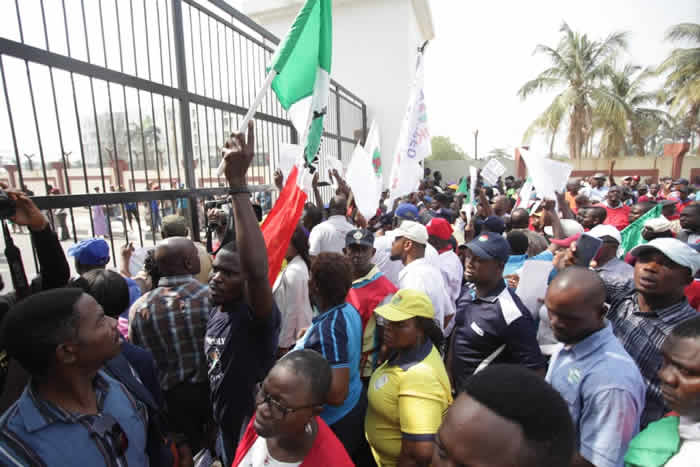On Wednesday, labor unions denounced the Federal Government for cutting N100 billion from the supplemental budgetary allocation meant for salary awards to federal public servants, stating that this was not in accordance with their agreement with the government.
Data from the recently released Revised 2023 Supplementary Budget showed that the government increased defense spending from N476.54 billion to N546.21 billion, earmarked N20 billion for capital supplementation for the National Intelligence Agency, and replaced the contentious N5 billion presidential yacht votes with Navy barges.
The National Assembly was forced to revise the recently passed N2.1tn 2023 Supplementary Budget due to uproar over the finding of goods that appeared to be expensive.
The four-month pay award was estimated to cost the Federal Government around N210 billion in the draft document. The authorized and recently updated document, however, indicated that the Federal Government would now have to pay almost N110 billion for it. The Ministry of Defence budget increased from N476.54 billion to N546.21 billion in the amended budget, reflecting an extra N69.67 billion in funding.
The Nigerian Navy, which was previously involved in the contentious N5.095 billion purchase of a presidential yacht, received an extra N25 billion to its overall budget under the ministry. The approved document increased its overall allocation from N62.8 billion in the proposed supplemental budget to N87.8 billion.
It also observed that the presidential yacht was replaced by the purchase of a self-propelled barge with the same amount of N5.095bn. Self-propelled barges are cargo-carrying vessels specifically engineered for operation on inland waterways. The Nigerian Navy also got extra allocation for the construction of two buildings in Enugu and Ebonyi worth N3bn each. About N19bn was also allocated for the purchase of two tugboats, which are used to pull or push other large ships for manoeuvring or salvage purposes.
The Defence Intelligence Agency got an extra N30bn to its total allocation, from N17.04bn in the proposed document to N47.04bn in the approved copy. allocations to the Office of the National Security Adviser, headed by Nuhu Ribadu, increased by N20.3bn from N29.7bn to N50.02bn.
Similarly, the purchase of official vehicles for the office of the First Lady valued at N1.5bn remained in the budget, while the education loan fund for funding student loans was increased to N10bn from N5.5bn previously allotted.
Recall that the Federal Government, as part of steps to assuage labour unions, had granted a wage award of N35,000 to all Federal Government workers “beginning from September pending when a new national minimum wage is expected to have been signed into law.”
President Bola Tinubu had declared during his Independence Day speech that “low-grade workers” in the federal civil service would be awarded a wage of N25,000.
The amount was then increased to N35,000 following discussions with the organised labour unions. However, civil servants received a single payment of N35,000 for September only and not for two months as promised.
It is still unknown why the Federal Government decided to slash the allocation of wage awards for federal workers, but the Nigeria Labour Congress and the Trade Union Congress warned that this would be resisted.Labour unions, on Wednesday, lambasted the Federal Government for slashing the supplementary budgetary allocation for wage awards to federal civil servants by N100bn, warning that this was not the agreement they had with the government.
Data obtained from the newly Revised 2023 Supplementary Budget, indicated that the government swapped the controversial N5bn presidential yacht votes for Navy barges, increased the budget for defence from N476.54bn to N546.21bn and earmarked N20bn as capital supplementation for the National Intelligence Agency.
the recently approved N2.1tn 2023 Supplementary Budget was marred with controversy following the discovery of seemingly extravagant items, forcing an amendment by the National Assembly.
In the proposed document, the four-month wage award was to cost the Federal Government around N210bn. However, the approved and newly revised document showed that it would now cost the Federal Government about N110bn.
Also in the revised budget, the Ministry of Defence budget rose from N476.54bn to N546.21bn, indicating an additional allocation of N69.67bn. Under the ministry, the Nigerian Navy, which was earlier caught up in the controversial N5.095bn for the purchase of a presidential yacht, got an additional N25bn to its total allocation.
Its total allocation rose from N62.8bn in the proposed supplementary budget to N87.8bn in the approved document. It also observed that the presidential yacht was replaced by the purchase of a self-propelled barge with the same amount of N5.095bn. Self-propelled barges are cargo-carrying vessels specifically engineered for operation on inland waterways.
The Nigerian Navy also got extra allocation for the construction of two buildings in Enugu and Ebonyi worth N3bn each. About N19bn was also allocated for the purchase of two tugboats, which are used to pull or push other large ships for manoeuvring or salvage purposes.
The Defence Intelligence Agency got an extra N30bn to its total allocation, from N17.04bn in the proposed document to N47.04bn in the approved copy. allocations to the Office of the National Security Adviser, headed by Nuhu Ribadu, increased by N20.3bn from N29.7bn to N50.02bn.
Similarly, the purchase of official vehicles for the office of the First Lady valued at N1.5bn remained in the budget, while the education loan fund for funding student loans was increased to N10bn from N5.5bn previously allotted.
Recall that the Federal Government, as part of steps to assuage labour unions, had granted a wage award of N35,000 to all Federal Government workers “beginning from September pending when a new national minimum wage is expected to have been signed into law.”
President Bola Tinubu had declared during his Independence Day speech that “low-grade workers” in the federal civil service would be awarded a wage of N25,000.
The amount was then increased to N35,000 following discussions with the organised labour unions. However, civil servants received a single payment of N35,000 for September only and not for two months as promised.
It is still unknown why the Federal Government decided to slash the allocation of wage awards for federal workers, but the Nigeria Labour Congress and the Trade Union Congress warned that this would be resisted.













